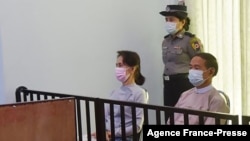A court in Myanmar is due to deliver the first rulings on Monday in the trial of Nobel Peace Prize laureate Aung San Suu Kyi, the popular former leader ousted by the military in a coup 10 months ago.
Suu Kyi faces a dozen cases that include multiple corruption charges plus violations of a state secrets act, a telecoms law and COVID-19 regulations, which carry combined maximum sentences of more than a century in prison.
The verdicts are deferred from last week, with Suu Kyi and co-defendant Win Myint, the ousted president, facing jail terms of two years for incitement and three years for breaches of coronavirus protocols, if found guilty. They deny the charges.
Supporters of Suu Kyi, 76, say the cases are baseless and designed to end her political career and tie her up in legal proceedings while the military consolidates power.
The junta says Suu Kyi is being given due process by an independent court led by a judge appointed by her own administration.
Myanmar has been in turmoil since the Feb. 1 coup, paralyzed by protests and instability that escalated after the junta's deadly crackdown on its opponents, which it calls "terrorists."
The international community has condemned the violence and Western states have demanded Suu Kyi's release.
The trial in the capital Naypyitaw has been closed to the media and the junta's public information outlets have not mentioned the proceedings. Suu i's lawyers have been barred from communicating with the media and public.
The following is a summary of cases against her, based on information available to Reuters.
- Intent to incite, after her party sent a letter in February to international organizations asking them not to recognize the military government (Penal Code, Article 505). 1 case, maximum two years in prison.
- Breaches of coronavirus regulations during her party's election campaigning in September 2020 (Natural Disaster Management Law, Article 25). Two cases, maximum three years in prison for each.
- Possession in February of unlicensed walkie-talkies and a set of signal jammers (Export and Import Law, Article 8). One case, maximum three years in prison. (Telecommunications Law, Article 67). One case, maximum one year in prison.
- Obtaining, collecting, recording, or publishing or communicating secret information that could be useful to an enemy (Official Secrets Act). One case, maximum 14 years in prison.
- Prosecution for "electoral fraud and lawless actions" (status unclear).- Violations of the anti-corruption law (Sections 55, 63). Six cases, maximum 15 years in prison for each.
Allegations include:
* Misusing funds from the Daw Khin Kyi Foundation Suu Kyi chaired, to build a home.
* Leasing government-owned land at a discounted rate.
* Accepting bribes totaling $600,000 and 11.4 kg worth of gold bars.
* Misuse of state funds for renting, buying a helicopter.





